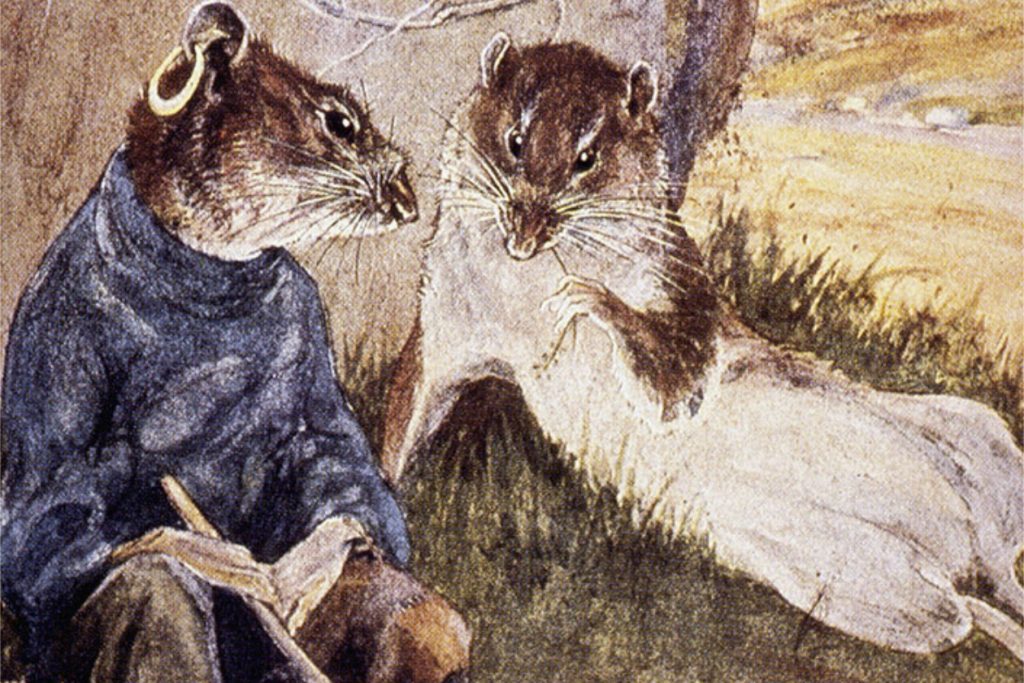I recently introduced Kenneth Graham’s children’s book The Wind in the Willows to my German wife. If you’re from Britain you probably know it. Four friends – Rat, Mole, Badger and Toad – have a number of adventures. One chapter concerns Mole’s misadventure in the Wild Wood, when he decides, against the advice of his friend Rat, to pay a visit to Badger, who lives there. It is dusk, and as he walks deeper into the wood, sinister things begin to happen – first the faces come, evil wedge-shaped faces with hard eyes, ‘hundreds of them … all fixing on him glances of malice and hatred’. Then the whistling began, and he was ‘alone, and unarmed, and far from any help; and the night was closing in’. This is followed by the pattering, which increases until ‘the whole wood seemed running now, running hard, hunting, chasing, closing in round something or – somebody?’ A rabbit dashes past him, ‘his face set and hard, his eyes staring’, muttering “Get out of this, you fool, get out”. Eventually, as he throws himself into the hollow of an old tree, and
… he knew it at last, in all its fullness, that dread thing which other little dwellers in field and hedgerow had encountered here, and known as their darkest moment – that thing which the Rat had vainly tried to shield him from – the Terror of the Wild Wood!1
Reading this again reminded me of an early Buddhist text in which a Brahmin named Jāṇussoṇi remarks to the Buddha that living alone in the jungle (as the Buddha and many of his disciples – bhikkhus – did) must be very hard to endure, and that “the jungle must rob a bhikkhu of his mind, if he is not integrated.” The Buddha agrees with this and then goes on to describe how it was for him, when he lived alone in the jungle before he became the Buddha (i.e. before his Enlightenment, when he was simply Gotama). He tells Jāṇussoṇi that he was in fact integrated – he had a firm basis in ethical conduct and a high degree of control over his mind, and these helped him not only to endure being alone in the jungle, but even to enjoy it. (Unlike poor Mole, who hadn’t trained his mind). However, the Buddha goes on to say that there were times when even he dwelt in “such awe-inspiring, horrifying abodes as orchard shrines, woodland shrines, and tree shrines”. At those times, he says “Perhaps I might encounter fear and terror.’” He continues:
And while I dwelt there, a wild animal would come up to me, or a peacock would knock off a branch, or the wind would rustle the leaves. I thought: ‘What now if this is the fear and terror coming?’ I thought: ‘Why do I dwell always expecting fear and terror? What if I subdue that fear and terror while keeping the same posture that I am in when it comes upon me?’3[/efn_note]
To ‘keep the same posture’ means that if he was sitting he would remain sitting, if standing he would remain standing, and so on. In other words he didn’t allow the fear he experienced to change his behaviour. He continued to do whatever he was doing.
The jungle of course, like the Wild Wood, was objectively quite a dangerous place to live. ‘Wild animals’ would have included lions, tigers, elephants, rhinoceros, poisonous snakes, any of which could kill the Buddha. Not to mention human beings. One of his foremost disciples, Maha-Mogallana, was murdered by bandits while living in the jungle. So the fear and terror he experienced were not irrational – there really were things in the jungle that could attack and kill him, or at least leave him seriously injured. To subdue that fear then was a real, heroic achievement.
Britain has become a very risk averse society, and ‘safety’ has become one of its highest values – it seems that we must make sure we’re safe at all costs – we’re often exhorted to ‘stay safe’. These days health and safety officers would try to dissuade the Buddha from putting himself in such danger. But to him and many of his followers – and those of other spiritual traditions in India at that time – living alone in the jungle was a risk worth taking, because of the great spiritual benefits it offered.
Mole considered visiting Badger in the Wild Wood a risk worth taking too, although he under-estimated the risk and his ability to deal with it. But don’t worry, he was rescued by his friend Rat, and they visited Badger together. It’s a children’s story after all.
Footnotes
- Chapter III, The Wild Wood.
- 2Bhayabherava Sutta, MN 4, translation Bhikkhu Bodhi (slightly adapted).



